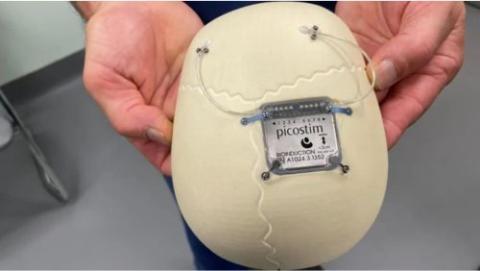
A young teen in the UK has become the first person in the world to be fitted with a new device to control his seizures.
Oran Knowlson, who is 13 years old, is the first person in the world to have a neurostimulator fitted in his brain.
As many reading this will know, epilepsy is a tendency to have repeated seizures due to bursts of electrical activity in a person’s brain. The device Oran has been fitted with is a piece of technology which is implanted in a person’s brain which emits a constant pulse of current that aims to block or disrupt the abnormal bursts of electrical activity which causes seizures.
Oran lives with Lennox Gastaut Syndrome – a rare type of epilepsy characterised by repeated seizures – and was fitted with this new device last October at Great Ormond Street, London as part of an ongoing clinical trial under the CADET project.
The CADET Project is a series of consecutive clinical device trials being run by experts and researchers from leading UK institutions that aim to investigate the safety, feasibility and effectiveness of deep brain stimulation to treat children with Lennox-Gastaut syndrome.
The news of this new procedure taking place has made international headlines, and according to media reports, Oran could experience hundreds of seizures a day. Since being fitted with the device, he has seen a reduction of 80% in his daytime seizures.
This impact will of course be exciting to many living with epilepsy, and the epilepsy community as a whole but it is important to state that this research is ongoing.
We will certainly keep a close eye on how this trial continues to progress in the hope that it will develop into a new treatment that is available worldwide. As always, we will continue to monitor emerging epilepsy research and post updates on our website and social media channels.
If you need any support or information regarding your or your loved one’s epilepsy, please do not hesitate to contact your local Community Resource Officer. You can find their details by visiting the ‘Our Local Services’ section of our website.
You can read more about this story - including an interview with Oran’s mother, Justine - by visiting the BBC News website. We would like to wish Oran well as the trial continues to progress and hope that he continues to see an improvement in his condition.
